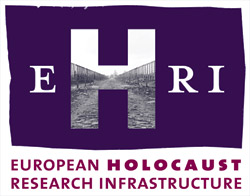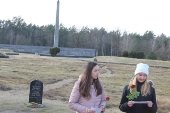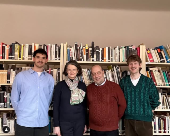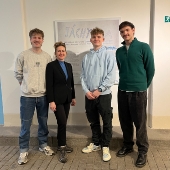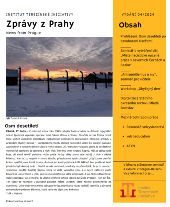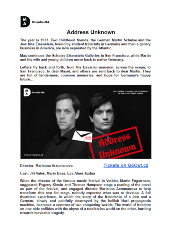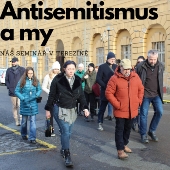EHRI – European Holocaust Research Infrastructure
EHRI Czech National Node
Top-quality research on the Holocaust is a prerequisite for informed discussion about Czech, European and world modern history and for understanding the risks and mechanisms of racism and genocide in their various forms. The European Holocaust Research Infrastructure (EHRI) connects collections and sources divided by borders and languages, promotes digital methods and supports researchers. The Czech EHRI national node is a gateway to EHRI services and community and a signpost for Holocaust research in the Czech Republic.
Example of a document from the Terezín Research Guide
Research infrastructure
The EHRI Czech national node has been part of the research infrastructure LINDAT/CLARIAH-CZ supported by the Ministry of Education, Youth and Sports since 2023.
EHRI is funded by the European Commission under FP7, Horizon 2020 and Horizon Europe.
Since 2018, EHRI has been on the roadmap of European research infrastructures and is currently transforming into a permanent organisation - European Research Infrastructure Consortium (ERIC). The Czech Republic supports this process through the Ministry of Education, Youth and Sports and is represented in the EHRI Interim General Assembly.
Main goals and services
EHRI-CZ provides the following types of services:
- Makes EHRI data and services available, including EHRI Portal, EHRI Document Blog, EHRI Editions, EHRI Geospatial Repository, Conny Kristel Scholarship, and others.
- Creates data on sources on the history of the Holocaust in the Czech lands and uploads them to the EHRI Portal.
- Links and enhances the victim databases and methodologically supports their further development.
- Applies digital methods to the digitised sources, including automatic text and speech recognition, identification of places, historical actors, keywords, etc.
- Supports research using spatial methods and interactive maps, including the MemoMAP application.
An overview of all 27 EHRI partners can be found on this page.
TEREZÍN INITIATIVE INSTITUTE
In 2023, the ITI identified documents contained in the Holocaust Victims Database for research on automated reading of archival materials. At the end of 2023, the database contained 185,166 documents relating to 176,239 persons.
The content development of the Holocaust Victims Database involves research at the State District Archive in Mladá Boleslav. Around 2,000 documents were scanned. The digitized documents are gradually being processed and prepared for import into the database and for subsequent publication on the Holocaust.cz portal. Since some of the documents relate to people who survived 1945, the ITI can only proceed with this step after the clarification of the data protection issues (GDPR).
Yesterday, together with the participants of the seminar and excursion Bergen-Belsen on the Threshold of Freedom, we attended a reception at the British Embassy in Prague on the occasion of the 80th anniversary of the liberation of the Bergen-Belsen concentration camp by the British Army on 15 April 1945.
Anne Frank and thousands of others. We visited the place where the fate of one of the world's most famous stories came to an end, as well as that of countless of others. The Bergen-Belsen camp was burned down after the war, but one can still hear echoes of the past. How can we learn about the horrors that have gone to ashes?
Yesterday, we welcomed Director Denise Quistorp and Sebastian Halbauer from the Austrian Cultural Forum in Prague to our premises at Jáchymova to exchange views on our respective activities and projects. This gave us the opportunity to identify common priorities in our work and to further strengthen Austro-Czech exchange through future cooperation.
This week we received a visit from Ms Krejcova (Foreign Culture of Lower Austria) and Mr Halbauer from the Austrian Cultural Forum Prague, where we were not only able to present the work of the ITI, but also make personal contacts. We were able to discuss many topics that overlap with the work of our three institutions in order to promote Austrian-Czech exchange.
The MA Theater would love to cordially invite you to the Prague premiere of the theatre play Address Unknown, based on the 1938's best selling book by Kathrine Kressmann Taylor. The MA Theater's performance is taking place on the 28th of January at 7:30 PM at Divadlo Na Prádle, Besední 487/3, Prague 1. The play is performed in English.
You can learn more about the play here or in the attachment.
The year is 1933. Two childhood friends, the German Martin Schulse and the Jew Max Eisenstein, bound by student fraternity in Germany and then a gallery business in America, are now separated by the Atlantic. Max continues the Schulse-Eisenstein Galleries in San Francisco, while Martin and his wife and young children move back to native Germany.
Letters fly back and forth, from the Bavarian mansion, across the ocean, to San Francisco, to dear Maxel, and others are sent back to dear Martin. They are full of tenderness, common memories, and hope for Germany's happy future...
Direction: Marianna Arzumanova
Cast: Mario Baas, Jiří Valeš, Eva Alner
The original script, direction, scenography and soundtrack are work of Marianna Arzumanova, the director and founder of Prague's Theatre MA. The show premiered on 18th July 2022 in Verbier, and was shown again in London, New York, Geneve and Schloss Elmau, starring world-renowned pianist Evgeny Kissin and baritone Thomas Hampson.
From December 6 to 8, 2024, we hosted the seminar Antisemitism and Us in Terezín for teachers and peer educators from the Anne Frank Youth Network (AFYN). The event was organized in collaboration with European Practitioners against Antisemitism (EPNA), and with support from the German Federal Foreign Office.
Program and Key Speakers
The seminar offered a rich program focused on how to teach about antisemitism and the Holocaust in a way that has a tangible impact while avoiding unintended antisemitic outcomes. We were honored to welcome outstanding speakers:
- Tomáš Kraus, who guided participants through the authentic environment of the Terezín ghetto, sharing his family’s stories to enrich the educational experience.
- Jakub Drábik, who gave a lecture titled What is Fascism?, exploring its origins, manifestations, and methods of prevention.
- Peter Weisenbacher, who presented FRA research and additional data on how antisemitism is perceived and experienced by members of the Jewish community in Slovakia.







